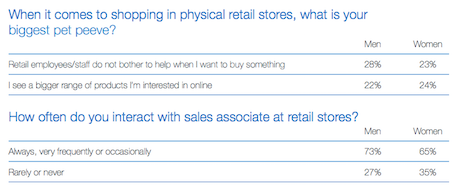In the world of physical retail, men and women share many of the same interests and habits, but key differences appear in terms of mobile engagement and convenience.
Women are much more likely to engage with a retailer through mobile devices, while men are much more likely to engage with a human sales associate in a bricks-and-mortar store. This data comes from Euclid Analytics, which took a look at the difference in shopping habits between men and women.
"Our study underscores that, despite technology's increasing role in physical stores, customers still enjoy personalized human interactions while shopping," said Brent Franson, CEO of Euclid Analytics, San Francisco.
Men and women
Mobile is a key part of the retail experience. Studies have shown that customers are increasingly likely to use mobile to research products, compare prices and consult with friends and their social networks while they are shopping.
Euclid’s study revealed that 37 percent of women text or chat with friends about their purchases while they are shopping compared to just 24 percent of men who do the same. This proclivity towards mobile use in store extends to other uses, such as 41 percent of women looking up email promotions to use in store and 42 percent of women who take pictures of products in store to remember for later.

Men and women's biggest concerns. Image credit: Euclid Analytics
Men tend to do all these things much less frequently.
However, 73 percent of men will seek out an associate in store for help compared to 68 percent of women. Because of this, inattentiveness or lack of help from sales associates is the biggest pet peeve for men.
Despite this divide on technology, both men and women overall prefer stores that mix technology and human-driven assistance. Less than half of men and women were interested in an entirely technology-driven store such as Amazon Go.
Mobile tools
The relationship between mobile and luxury retail is only going to grow in importance over the next few years. Retailers especially need to begin thinking about mobile as the holiday season inches closer.
During Facebook’s “Holiday Preview” press brunch June 27, two executives shared holiday trends, research and predictions, as well as new tools created by the social network to drive sales this upcoming holiday season. Although consumers tend to only start shopping in October, 69 percent of marketers begin planning for the holiday rush in August, taking a “never too early” approach to the gifting season (see story).
In the coming digitization of all areas of commerce, mobile will serve as the hub for experiences that branch out into wearables, virtual assistants and more, according to a recent report from Forrester.

Men and women's mobile use. Image credit: Euclid Analytics
The report takes a deep-dive into what the retail marketplace will look like in the future with Google Home, Amazon Alexa and Apple’s newly announced Siri product becoming major parts of consumers’ commerce journeys. What Forrester found was that no matter what new devices come, mobile will continue to serve as an anchor point between all parts of a consumer’s digital life (see story).
Luxury retailers, by virtue of selling an expensive product, will get customers who need to be more confident about their purchase decisions before they make them. Mobile can act as the decider between buying something and not.
The retailers that make the most of mobile and understand the way that different demographics of shoppers interact with it will have the most success.
"Ultimately, retailers that thrive will use data to inform immersive, tailored experiences for their physical locations – harvesting a deeper understanding of all their customers; delivering tailored, cohesive experiences across both digital and physical platforms with human interactions at the core," Mr. Franson said.
{"ct":"y\/dFh8D3NyJ7V6hL1ZOswDpmuodFAVSzLd2e\/DakmJvo21MVo7M8MuMfR2fL4KnXSARW1da1Nx6pghzcztE1iHsJB\/gaJdsQMkd6+lZ4ypnIxcRGosS0SfkbKYYpo9EzGvgAsbCv10odNX5n2KJXC2hiJxKW6wue\/mOEmKLkc7hTbRk0AxLaboVTH93PA7ixEYlM11n1CB22Pg0PzoHbmFbxPEwMD5QyK0B9CdzbXBeCdboI+9dE9GaSeYCk6j2K3QsHRwz5Mu9o1aPfrXhu1sYm98mBLM2GxZ6Pw76ymugpq0pWho5Crb2q39F3lYx20ZmTvUwAdZeIW9cYwb9P7dRsWOChu8TJGRd\/\/gbETiRfLZWaDABxeCsbjp8cpFJLoFbwhOZii\/P7QEgyxx\/PMCFmJHgUoDQvRckj52v58XLgxMoy7wWLBrjlXtpMFpuqquilU9\/rKGrk4nowPFuxVpp13eNDCVYsutMhpWqbZlUoRrGX0El8Hdz2LzrcWH9RzTwFSz25RfA30SN7wKNyu4s2Wdh4c7Wyto\/8zY1jjV035OdkLNXZ+IBlKnzqmgpQ+GR8mroSzhuGJqQr5yb5ReOu6TxNLECJ2tYBcvlTZW4mHAB2eCKcGltCWBE78hbQUbb4nKHb4u4eLf4c4383le\/cl4r+Lqmc\/D7eh+19+IAtvz6G6x5gHMvDRgiVRHkwd2yKYGGnZt4kveu9NnozrYoigvsuGpmraOLzFAFJWe1vrJlFT48NB8R8DT4XONNj3ApJBkIEV3WgMmNKxKxX6kLYjzcOQyBgd891o1\/\/RMiEMRNj0PpwzkNGoDuDVlrNZrRT8+g5CjJcfnUsqYEz1FNA3qtamEA7IfXeiwdgmygxyUUeAPWUA+2KoFKzFYOI6YA6NkGlLCIHwngVt9J8Rxjcq2ydy4V73JB3GNQCdeii1IQmseTQoJXjwLtmRic1S5yTtnDG4388FWj7dbCwVn5360AvF7Q00LJfN10+LlcqmA7rebZ5o1TrFmR4FYIuNXx9n2XGAcblcYykrGpb7b9vSaz4aiT5RWeaoUhfPx6ATsINk8Q68BiPUts9+JOjgnyo8lwaazg6We7TPZZ3Ck248c4osCSNhmEwAc6qUwPoO7BZgwpZx1iizHSeDSQanGuVpyjzc+ssAk9u6X4Delhub3ITm6CaS6xZrqHJHtW6gZz9sIhMeqYVhiTP7RXMtC6ZZ8Ph5hvji98EfMJWmxV5ht+PfBTqje\/L+H2rtIInrt91yDwm0voee4++Tko96UJAT+t2ZTrvM6cDOgTaTsKpyNPA7nqpzvLi5qHoontBrU4\/K86Ld\/HEn2jlwv9cHPm3Tld3OS7QbwFwKbNR\/BwQnFSlZSgFvyVXRFXogzTp8mnO\/MIvhByW2mNnex5U0y\/Wq1jF0LGb11WFLYDSnlpnVTFbXEmjjJ71VC9cpir9ecM6Q8IU84LTvIHVOLtu8gYxMRWxYEA\/94+S2KenZY+5azeXWLXpJbTivmlnyORy2wZeI6ryCBuv7zDZvwFSL7+9wG4tNsmt6Q0zx6l34q1KUr1Upp3kC4xsYUb719juxOB3aq4QW5I09nZcUcFmEG8iTcw5KGPmFpRz9CcB8i\/w5XIf4znrqLfV5c4VeZTpxg5Zp28S+YDnwbRDDGm0lWohH4v5wtqmngD6GYo4jpWrEOXDmbkMS3n7EwHhnyorsZV7id1bRQZLQjQpzsqALBsNW4cq6XOtirCMc5vGdxI53xqUtBWiGMaSDwPkGdp4PFd8T4aKBi9+sptiypqxYUG2\/6IIVJEl4xQqSrz6HN2Hk69ANbHyfBXLNycCKgtVJ3n80RbkVnfPXabHiAIiCDDGTHlUgwg8gVs4O4GzLixL0feRFCZV+KLomlNrHZ9QxgUn4qbBbu7GbzWORoJ1cV1g9OoEnBtEh8bdI+EZ70bwEV2a\/cwocuYYrrOIsbA9ER2PQ8Kr85gyIxqbrfl2cdbfoQ+NDflsfi4ZQbRTIFulLP2r5HgpDn0fRxPljCq+Y0ccvMZUBWdspL5dSDGRrCFeruYUkB2\/FxBPIoj0t70Czu9dvksefBBFwt\/aHlFi2LKGPwvU\/LvWKBimCr86shWRgoNvj5SwGOQshqiA3csICFEuz\/VxmYbJMBKL0R9aDmsVKffleAZ9pxMu1FVIIj36ulxjNx4lp8oPRWsAUjtUYPyF5vuTA\/M0+Ol\/qkAVOJUcK9ugdrYmLU+KEoNrBojEnmM\/E0gXW+suRr0EYkSMiLwazcIzW3n7rADcNQwUHFxMknon80P4iSmhMuPsQY\/MI6aOy1DaHy1PjLIGX0TvJOR7cCiZS\/5JKUpusG4oIbHA0gIcbIcaR6zJ1tsVusBgHnqgfmIrgcZCZOsgc9cMAOvWUjC0zhloequMBArG+AoPJr2mi5W3+3vpv0TKlQmOFzKXNGSe7mBByzcALVnFxKfyGCpRiE497Th2HC9+Py1R4aArf5KHyPzmiSTIUK2em4TAVe4JWQfQnzHNneqkrusRKLf0jdGPovmXI9HxU2Ijh03LkA7GPFYFucbccw0PjH\/MGWIG0EKdJGHBTPurIfKhe7vDJt\/m6Y2enGdPKCVudL8X3TsZAERhH4GDEfSaBD7yuVdepnibKp3\/5lM0YDGnX2dyDZgckE0LPEAzszIzJA3s81J0tv3UikpqHSGAXBk2mGBtMEQ8bwUCiidY5hHW1\/lDGzvnY+iyf26XyFIy0LTMKaDjq0l\/Hcybqbe3oNY2JfEqlAYuKscp7MDMZ1aME9Tb+XPcN\/LyYPtpYhcTH9GGV95wBT5lcBd0+a\/fyw2iwmLIIEQ7KYNPPhNH1iRY2mbNT0zLHDzGL+o7f50dMUa7qoW6EcsaoFXjjm5HvZPGk\/C8O3vWct4Al5bmSGbIJAbp2O5v2ftya0+NSSDP1jQdB+tZpMJOXQ2bC+rN2KpkLICLX6E1GeuworjN+C9PE\/07e8Y\/Zfb6sYlmdvAKc9EpFpKilHrocfFjBD1ohQ8B4lwjcOdIXRFSBa2MMveIsb4Wm8WerHugB7pMtKFJnAamcOaZ1GguTcc2JfzKOk6mrRxefzefnWIXtWo6iD3y3CtML9l2ThVRsM1KWlJd31D5tkxC7sDNodmkCOzYNdHDc3hODMNKKSLzBkM5\/JUsD6fiFKSs8ZF68VJ\/T+MWEdubCyi5lMKf9Hh9b8QWG+oXyK\/QPDkV\/G6hY6gU3jliKni+n4f5FFOtH1cPMdjeMsr9a4SMJFU4zYL7SiIRHp0RqVR9Fj8FcTAMhYrCH5pUX5MsS+CjkVpEq72UAjnAFobDlxA\/e9qlDCICF46evZ+ykH1D3wRsL9o7AbS5ezJ00hH5q4n6tEhj1Kly84zGwy4y8kWr8VLWaHMZ+LUdiEllbWVCMKnAjrYSHNECdsscR+WeyQLY6+gi\/aRuaSkuYtjEW13XdW1rFGzRplo01tthyWgCdI+HXTrM1fe2d0X3Rm1KtIuTb\/9uswMKdIq92g6wYE5OGJeb\/l\/PKUlqnilu09tfs02cnf+G00ETvnlWf8cU8ComROfwEvv8LdAejzm+PVYRJhGR\/a+OO3fSObMR7SPLA72iO65K4ly7pOyJ1vGjwo3bqVeQpXHFAdVq3OBWL96Qc7TEB9oz3Fw+GRMG7amJUCNQ5YbMT24Piu0AXzY3HiVkejXoLjr3tMqZx8z8S8oYRWR+vDRG4xFWV3j2GTcsuWlIGV87LCkWF8JtyPwc32DSVZ+exEnYXU3eCafIZ4I86SKDCE8B5nvfeuovnaQQJXNgucdJ9h+zf3sDdBDHP6DEMhvPbPJTZGmwqvz4CUe23vp6TgZQFU33TSIgfcfaW3SqYdNlHmVUWY1F71wyKKl5vKBEu0bN3Zmr8A2vbpNlROS\/jY+RsEyIqZgKdM5BfpC\/5EK8LuicVCwkp45yDj2psnJCgC0hLBwzPG4jwhydCGkBL3WLpE3jmsa5PcGcOAn3Yaj9GjkxWgcs\/P026MLYwiVfexcZY+jWZSQ2uYQ+TwKD23cjj\/Fs\/qDHGqmPAg9qtoyqe1Jt0\/FYDYBQYo98WEuq0vr+Aj6DM0tixPUUNrxrNOnVkeD7iKAOXZ5+I1Gjk7Bt3xcoyqNJuAXBpr1WWLjU6dl9R0Wz8FIFCmmL8mYpASFs4uUm4TZB4\/4pWTZD+KrZyofyya1B0HI6aP\/rzeHo3OqfMl+mBpqX4XLaGtTQNm41CPFk0oroWrN5NiAhWSigMsYuTWu+AZoXxalxBrMVMnhKs890k29CV6fzCxoO\/v+JVbnRYOfV940oA2t1y\/t9KMpyS8ofKnl29hsbOzrWypcXx5kLqP3QQcTXE\/81hlSqPnHwcbKIgVu2Vhl0kJMlyqXR4Xy1MfbSZJrfRTWHQGhnES9kMoViJguhGzTjSp7ChV55Fnf7oDzfH\/3vcqzwMNJXZJnp2GZzoWDTlgu9oz07C9mrhJY41bL96jieQ9LPDf\/gcBeKM+2ulg1+k2MXB4Q0XmAI2zRLOTv3nW4i0BOrmFQPLcmRYXfRLGagl8AnLQUloQMpquZmtZU0PS0yJJor9bEUHb3cJbS9xW5eiPNl1I+jPB71uVpLQE3eH6XkLK5HBLaEalFqbGoag34Nq5zYGn4XzWhYNzyK1rWrc4YnzmkA7f6bYHCT+WPzrV9YIL6kbZr9wE43WQrl9YiB1jLy6WkeG+1VjCYzBjnUXxdcBF9jQsicdwx6w3TRS7pXC80DY5sw7pJG2OksNXMoqBFY8X5FZk9ZZ6KOR65BN8Cuv5pdg3RI5WcplVS\/5difHn\/8SARZJTFkt8FeD9kHt5YKH+qQ6sh05BA8shpmeWUbCmvx1i5saK80XgEklnf\/Z2yu8z2l3HnSZx6Lpic35b4aM1JdriW\/qWtEgWPCa3VFll3o4dnkcjWoLQ2UhGKZzNbtDEXF4Mje6NQyKggyDrqBfL7PdLJefM1Pk+t1S2\/hR4f+ax97PpLJNDRD4ljbj4GiJp6cXGvUeg6VZrOkrGRtYVrX4wIpjSq1bshd0NZkpA9V8PBylcqdVbBIpwjpDbVmiZ4kh3f6vzT3MrKsARlKODtTPL+AShbEgnZYt5EbC5zWdSSGHj2O65c2VJFTllcM16r2GV4HtW6xdavn49cUGkfOGWxPhLnTGieyJIz7y04HLIiCl0FOkMhSET+vTKbAbea+1gPC8e3TK2PENHAyl3\/1xh+MNpdESnXjEDJ0gV1hHDXP23SwBLYJFxD9KDX\/tUjSmi7HYFY0IaddtY0BiTbPIpxdx2UAFgNtKtrImA3Tw+keZzD2Iyp3KvMjm1EBK\/8WRbZtH5cvVvGeG\/0FBmehiWG9zmirg+CcuvPz4N1xo6UbcBCxiPIZu6PpCruxqwL2BCUD3KI1Qs8XA3wccUuItyJfvJvauhMByaHH\/7ItzVrrZSgMivlwW8v0Bjec4FE3gVxamk9SjwsX+nsAirZ1SLb+otFhXMUBm7n73\/iJ1PM5DvNPxe4ts83YNXcb3tMr4xlv11V4fJ1\/lXogv55UyFaYvrWSN16Kg7Q7KolQYtA6Djkk6XZaMjs2bi9OyFLDNuWtGMkjXM2zB4HcjGMQB9iVYR0Q2Bj+whJEyjaDYG+sa3sELWnzSiVkV6E8XNZXPVxzEeOHeW5eNGKmQvPeQxA0HZ1alUbbPpGoVEYARbplnpGpalFB\/fVHmfatqvK4SJjkBI4s252pcG99mJp83i9JAmnaIxHnpCYzm0cy8ygp9xq8ijoZqMBzzQqs7oagtZKLFT5pUjHmHFOb2zVwuSC5nfx05Z9Y+TegYt9ZClglTJ3Y+BoEU0mLKMuitQJbSiabd5UfDi0aMAnF\/f23iRMWdx+svw0tqNY4y9tUy89nmFTnSQEowvBbJg9DMHpwr7TDBJzWyJ9\/VfOEQYjcujkAo0Uxpe9wauZibnWZarRIcn09mJDNAjI\/cDPaDv5p+9wqW3Qp1LzxuXYoFaP5QLMSrjCTJ+zzIsPsrTvatyAKPzankP2sHADJ5\/rQjI7HewBIn\/BW97clhAV2UnTjN9OIL7vINTvcq5YXGPmCYhdJ\/iE5yRda8BUz0w7qxHWBUPpQ4P9aMxFr8LGTk6jXKtQkVLbVo4PtAwlrbV01140DkTDK6q\/NCGSqQ+6loc\/V\/SvTaguQ0tJWgKwux6Jq1koA1HmS7JqY1Tc2byrv560LE4ocHskX28Uxzp8HDDS8M6BPlcX0Olahyce6rH1aStzFajM8u5FJQwVZQ\/Ic\/CzeMVOYyvMRxWQUx0KkY4q6mIRuBKB0B547+Cnw3sH78o\/fgYQrDUBHKb\/75OEXxnln7QYyRrJspOhDaygdOuiUORihaDwxBCmiDrZ9KuqpvnlfFJqp1grSYunR6eqHIs468Elp3mqXXutiX8GBj58MbJwi1b2ilfaRIPrHAu9mEGTYVHa2dCXw16xP+z4Pt0G2vqJDdriB6CQWoGhSNXK1oGkXSkOIdYLrKKHOo9yk5wsRn3vSItX48QlkXP\/KHWgMspW0CzYvhp7Umlo7ThWuo5jd8Sp7BdVKj3VI0W+dV9XCkaqRcCqYaAIjcfhJ4C7QH+DNdO7CKKMHQoEfMzSEFw8MKOo\/VXrcyYviaRETkumzxyY92I6rzGzIZ6N5beLahaCgyYOcWiWkD5RNPpLqZEdl9z9+78XhQWdAA8f7eExv0vgH6WzFTDJeLkX+t+QI5J53N2AVvG+blgQRRCkAddmvBvav0U6HwsbY+SWZDt4z0hsdXL9zSftx08p\/h6anOxJRnSvhf5HThb4g\/UysHWKYcEy1WnBdygOQj1NUMhj4GAgAk7SP7BK5ypuaPevIluhls2TzuMtOJ3pYyEhPZi5nF9zn1+YlhgHLRu04F0jweBeGqfQ2JyZ2Kx6qUH+r6mGlOW3OkPbLgOy4DWno\/byqImb2tHfdrect8W4iIDxOlm\/QNlxZ1yvEPN60tiQBHWW9s9G19okluDTMFdP68W7x++CWR6aawK1RoQ65l2Q2Z8UZKqp4VJX3+rNdzH3mHpVWxcbAQqV9nzm\/tnIBQnhZdFpuNd\/rc3oc7h8qKWeepLyTztVVzZ2F9f0oA\/+SGHiEa+7vg2oY","iv":"81d2c2b0a55f0d54329ebcecf7e06075","s":"800e673103221f9a"}

 Both men and women are not interested in technology-driven stores. Image credit: Euclid Analytics
Both men and women are not interested in technology-driven stores. Image credit: Euclid Analytics